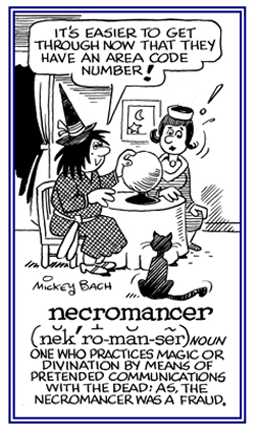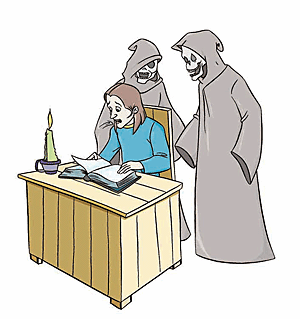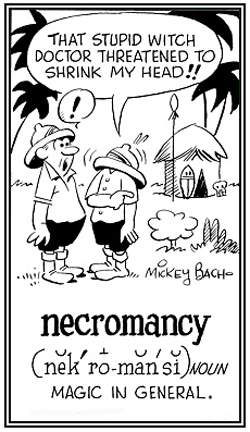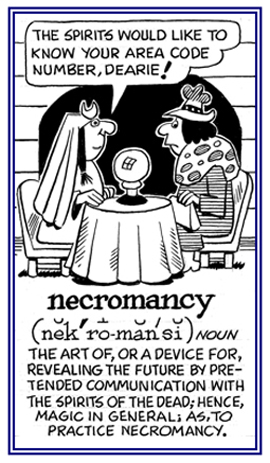necro-, necr-, necron-, -necrosis, nekro- +
(Greek: dead, death, dead body; dead tissue or cells; corpse)
necrogenic, necrogenous
1. Relating to, living in, or having origins in dead matter.
2. Growing on, or inhabiting, dead bodies.
3. A reference to organisms or factors that cause decay.
4. Causing cell or tissue death.
2. Growing on, or inhabiting, dead bodies.
3. A reference to organisms or factors that cause decay.
4. Causing cell or tissue death.
necrograph
1. A recording of the death of a person or people.
2. A written description or discussion about death.
2. A written description or discussion about death.
necrographer
Anyone who writes obituaries or about the subject of death.
necrolater
One who worships the dead or has an excessive reverence towards the dead.
necrolatrist
A worshiper of the dead.
necrolatrous
A reference to the worship, or excessive veneration, of the dead.
necrolatry
Worship of, or excessive reverence displayed towards, the dead.
necrologic
A reference to the dead.
necrological (adjective)
necrologist
1. A student of, or a specialist in, necrology (an obituary notice).
2. A writer of obituaries.
2. A writer of obituaries.
necrologue
An obituary.
necrology
1. A list of people who have died recently or during a particular period.
2. A notice of someone’s death; an obituary.
3. The science of the collection, classification, and interpretation of mortality statistics.
4. The study of decomposition, fossilization, and other processes affecting plant and animal remains after death.
2. A notice of someone’s death; an obituary.
3. The science of the collection, classification, and interpretation of mortality statistics.
4. The study of decomposition, fossilization, and other processes affecting plant and animal remains after death.
necrolysis
1. Necrosis and loosening of tissue.
2. Dissolution, separation, or exfoliation of dead tissue.
2. Dissolution, separation, or exfoliation of dead tissue.
A person who claims to have the ability to communicate with the dead as a means of predicting or influencing future events: When Sam and Joy went to the Medieval Fair in the village, they were delighted to see a pavilion for a necromancer and so they were determined to go in to have their fortunes told.

© ALL rights are reserved.
Go to this Word A Day Revisited Index

Go to this Word A Day Revisited Index
so you can see more of Mickey Bach's cartoons.
1. The practice of attempting to communicate with the spirits of the dead in order to predict or influence the future: As entertainment for the evening gathering, Ms. Hester-Jones hired a person to demonstrate necromancy so she could supposedly raise spirits and communicate with them.
2. Witchcraft or sorcery in general: During some periods of history, to be accused of necromancy resulted in some accused practitioners being executed.


© ALL rights are reserved.

© ALL rights are reserved.
Go to this Word A Day Revisited Index
2. Witchcraft or sorcery in general: During some periods of history, to be accused of necromancy resulted in some accused practitioners being executed.

Divination by communication with the dead by raising them back to “life” (not as ghosts). Early Greeks were supposed to descend into Hades to consult the dead rather than summoning the dead into the mortal sphere again. More recently, it is claimed that ghosts or spirits are summoned to speak to the living.




